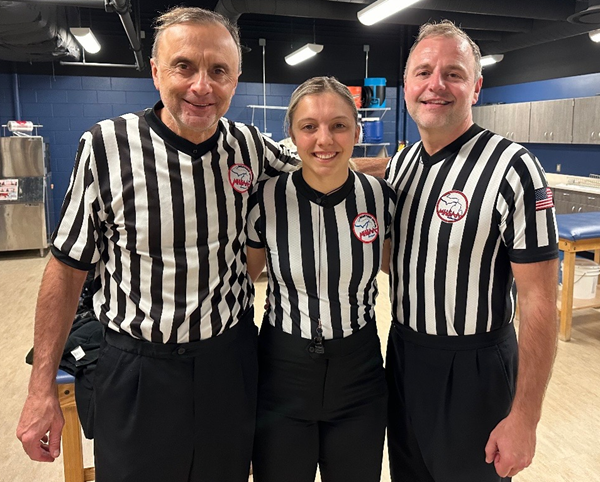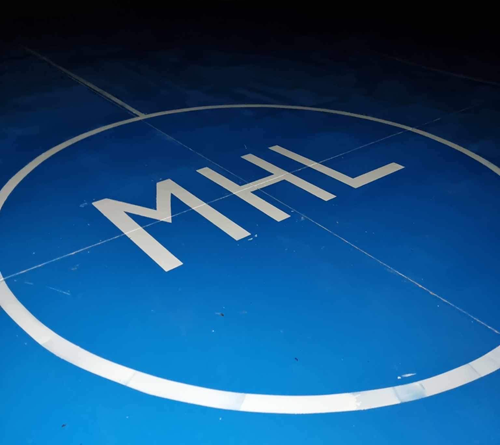
Officials Eager for New Hockey Format
July 12, 2019
By Rob Kaminski
MHSAA benchmarks editor
Tuesday, Feb. 26, was a particularly busy day on the ice as the 2019 MHSAA Ice Hockey Tournament reached just its second day around the state.
On the slate that night were 27 Regional games, bringing the two-day total to 48 on the heels of Monday’s busy calendar.
As teams were busy setting their sights on the ultimate goal, so, too, was another group of accomplished skaters who toil with much less fanfare. Nonetheless, the games can’t start without them – the folks in the striped shirts who call the games.
Just as players and coaches will welcome the expanded playoff format in 2020, the officials are looking forward to the change as well.
“When we got to the first week of the tournament, it seemed like we were going every day,” said Jim Gagleard, who assigns officials for the Livonia Ice Hockey Officials Association. “There are only so many officials to go around in any sport. By allowing us as officials a day or two to catch our breath, it’s good. Good for us, and good for players more than anything.”
If it seemed like every day, well, it was. A total of 66 games were played over the first three days, and 89 over the first four. Considering each game at the Regional level has three officials, that computes to 267 officials needed during that span. On the busiest day, 81 had to take to the ice.
Given that there were a total of 302 playoff-eligible officials in 2019, filling those slots can be a logistical nightmare for assigners at times.
“Regional week will see a huge burden alleviated for officials and especially assigners. There will be so much more flexibility under the new format,” said Dan DiCristofaro, President of the Northeast Hockey Referees Association. “Last year, we were faced with so many doubleheaders at single sites, and the first games needed an early start so that the second games would not last late into the evening on school nights.
“At times, the most important factor for the assigner was scheduling those officials who could get to the arena for the early start times. Merit and ability sometimes had to take a back seat.”
Gagleard agrees, saying, “Assigning-wise, early games are the toughest to fill. Everyone has a job, and in order to work a game they have to tell the boss they’re leaving at 2:30 for a 5 o’clock game. You start to look for officials who are retired, or can get out of work, instead of the most qualified. That’s not fair to the teams playing.”
In the northern reaches of the Upper Peninsula, the problem is more acute.
Sean Jacques is the athletic director at Calumet, and also an experienced official, having skated the Division 2 Final in Plymouth in 2016.
“Not enough,” Jacques said, in reference to the number of playoff officials in the UP. “Not enough. When I get the list of eligible officials that is sent to tournament managers, I have to search and scramble to find three people within an 80-mile radius.”
Moving the Quarterfinals to the weekend will definitely help matters, and eliminating Regional doubleheaders should ease the scheduling anxiety as well.
 “With Regionals spread out more, without doubleheaders, officials potentially could work more days,” Jacques said. “And there should be more availability for the Quarterfinals. The last few years, it was in the Sault, and getting four guys to the Sault on a weeknight, whether from Escanaba or northern lower Michigan, was difficult. There were times I’d turn down a Quarterfinal because I just couldn’t get there and back and make it to work the next day. Saturday makes it easier.”
“With Regionals spread out more, without doubleheaders, officials potentially could work more days,” Jacques said. “And there should be more availability for the Quarterfinals. The last few years, it was in the Sault, and getting four guys to the Sault on a weeknight, whether from Escanaba or northern lower Michigan, was difficult. There were times I’d turn down a Quarterfinal because I just couldn’t get there and back and make it to work the next day. Saturday makes it easier.”
On the west side of the Lower Peninsula, assigner Randy Sheahan uses a mathematical approach to illustrate his challenges, even for the regular season. Sheahan calculates that 98.88 percent of all West Michigan games are scheduled for Wednesday, Friday, or Saturday. Breaking it down further, 84.39 percent skip Wednesday and schedule only Friday or Saturday.
With the shortened regular season coming in 2019-20 to allow for a three-week tournament window, Sheahan took a proactive approach.
“When the MHSAA announced the change to a three-week tournament, I emailed all West Michigan coaches, plus a handful of athletic directors and booster leaders who may be involved in team scheduling,” Sheahan said. “I encouraged them if they are having difficulty squeezing all their games into a window which is now one week shorter, to give further consideration to playing on Mondays, Tuesdays, or Thursdays to greatly alleviate some of the stresses we place on the West Michigan officiating staff.”
As for the MHSAA Tournament, Sheahan agrees with his brethren across the state in metro Detroit that the expansion will benefit assigners, officials, and teams.
“I only see positives,” Sheahan said. “This gives me tremendous flexibility with our staff to maneuver around their professional and personal schedules to keep our best officials on the ice every round, which is an expectation teams have for playoffs. It also provides (at times) much needed rest for officials and teams, especially if they are involved in overtime affairs. This could help with the quality of overall game play.”
That’s the goal for everyone. Fresher legs for players and officials alike will provide a better experience for all involved.
“This allows for physical recovery for everyone on the ice,” said DiCristofaro. “It also allows for better time management for student-athletes, officials and coaches. Even at the Quarterfinal offerings with four officials for each game, we’d run into issues as far as which people could get to places, or wanted to travel and skate late on a work night. Saturday give us much more flexibility and should create more interest in the state tournament.”
The Quarterfinals, Semifinals and Finals have employed a four-official system in recent years, affording an extra position each game for deserving officials while adding to the quality of the game for participants at the highest level.
Sheahan plans to utilize the new format to continue to reward those among his troops who have earned their stripes for such contests.
“In theory, I may have opportunities to increase game counts for some of our perennial playoff officials, but I have no plans to do that,” Sheahan said. “We have other officials every season who are good enough to skate playoffs and have earned it, but simply couldn’t quite break the playoff bubble. Now the opportunity presents itself to reward some of those officials. It would be counterproductive to officiating development if fewer officials are getting opportunities for important games.”
Similarly, DiCristofaro is hoping the time will come when four officials will be assigned to skate Regional Finals, and perhaps the new length of the postseason will open the door.
“Some of most important games are the Regional Finals. Maybe this new schedule can help,” DiCristofaro said. “Four officials offer teams the best possible ice coverage, and they deserve that.”

Longtime Taylor AD, Game Official Ristovski Chose Athletics as Way to Give Back
By
Doug Donnelly
Special for MHSAA.com
February 20, 2024
There is a basketball court 5,000 miles from Sterling Heights with “MHL” painted on the center court.
 It’s not the name of a local basketball league in the village where it is located – Siricino, Macedonia. Instead, it stands for Madison, Haleigh and Lola, the three daughters of longtime Michigan basketball coach, referee and athletic director Loren Ristovski.
It’s not the name of a local basketball league in the village where it is located – Siricino, Macedonia. Instead, it stands for Madison, Haleigh and Lola, the three daughters of longtime Michigan basketball coach, referee and athletic director Loren Ristovski.
“My dad loved going back (to Macedonia),” said Madison Ristovski. “He’s probably gone every summer since about 2017. His whole family still lives there. He loved going and visiting and seeing everyone.
“It was always a goal of his to give back to where he came from. He and Mom donated to the village to build a soccer field and basketball court with lights and everything. It was a pretty big deal. It’s something he wanted to do for them back home. We were very proud he did that.”
Loren Ristovski, athletic director for Taylor schools, died earlier this month while on leave to have surgery on his foot. It was a shock to his family, friends, and the Taylor community.
“It was a heavy blow,” said Matt Joseph, girls basketball coach at Utica Ford and a longtime friend of the Ristovski family. “It was like getting kicked in the gut. Basketball was his passion. Next to his family, basketball was definitely No. 1. He loved the game and all the intricacies of it. He loved seeing kids excel.”
 Ristovski emigrated from Macedonia to Michigan when he was 9. He went to high school at Hamtramck St. Florian, where he excelled at basketball. He went to Wayne State University to get a degree in criminal justice and had plans to become a lawyer.
Ristovski emigrated from Macedonia to Michigan when he was 9. He went to high school at Hamtramck St. Florian, where he excelled at basketball. He went to Wayne State University to get a degree in criminal justice and had plans to become a lawyer.
Before he could take the Law School Admission Test, however, basketball came calling.
“He started coaching at Henry Ford High School and Fuhrmann Middle School,” Madison said. “Once he realized how much he enjoyed coaching, he decided to go into education. He stayed the entire time. He never went to law school.”
Loren Ristovski became the head coach at Harper Woods but gave that up when his daughters were ready to start playing in high school.
“He gave up coaching varsity at Harper Woods so he could be at every one of my games,” Madison said.
He also coached them as youngsters, often teaming with Joseph to coach an AAU team.
“I met him when Madison was 5,” Joseph said. “He and I decided to put our daughters in the same parks and recreation team, and next thing you know we were coaching AAU.”
With Ristovski’s tutoring, Madison, Haleigh, and Lola all excelled at the game, each playing Division I college basketball after standout careers at Grosse Pointe Woods University Liggett. In 2012, Liggett reached the Class C Final with all three starting. They combined for 55 of Liggett’s 57 points in the championship game, with Madison scoring 42 after earlier that week receiving the Miss Basketball Award.
Lola and Haleigh played at the University of Detroit Mercy, and Madison played at the University of Michigan. Today, Haleigh lives on the west side of the state and plays recreational basketball. Lola is a referee in the Catholic High School League as well as for the Division II Great Lakes Intercollegiate Athletic Conference, and also works area Division III college games.
Madison is a teacher and the varsity girls basketball coach at Sterling Heights Stevenson.
“He taught us the game when we were very, very young,” Madison said. “We grew up in the gym with him and watched him coach his team. He coached me my whole life. He was very instrumental – he taught us all those things you need to become an athlete, and more importantly the things you need to do to succeed in life.”
Her dad is the reason she became a coach.
 “Watching my dad coach and seeing the impact he had on his high school athletes and even the kids in our church community – it inspired me to want to coach as well and give back like he did,” she said. “I watched him with my teammates and the impact he had on them. I thought it would be so cool if I could do the same for others.”
“Watching my dad coach and seeing the impact he had on his high school athletes and even the kids in our church community – it inspired me to want to coach as well and give back like he did,” she said. “I watched him with my teammates and the impact he had on them. I thought it would be so cool if I could do the same for others.”
Loren Ristovski left a legacy at Taylor, too. School officials recounted several stories of how he balanced athletic budgets with the needs of student-athletes. He would lead fundraising efforts, created the Bitty Ball program for youth basketball players and cheerleaders and helped students become certified officials – and then would hire them to officiate games.
“He didn’t say no,” said Taylor boys basketball coach Chris Simons. “We made it work. We didn’t go out and ask people for a bunch of money. We would just do it. We all pulled together and made it work. Loren did everything he could to make things as pretty and presentable as he could with the budget we had.”
Ristovski also put on summer camps at both Taylor and at the Joe Dumars Fieldhouse in Sterling Heights, where he lived. He commuted about an hour to Taylor every day.
“He loved Taylor,” Madison said. “He loved who he worked with and the students. He included us, too. My mom would run the ticket table or do the scoreboard clock. I don’t know how many times I sold tickets for volleyball tournaments with him. He loved his people and loved having us there with him.”
Loren Ristovski, who played professional basketball in Europe during the late 1980s, ran well over 20 marathons in his life, including the Boston Marathon. He was a registered MHSAA official for 16 years, and in the weeks before his passing he refereed a varsity game in Rochester with his daughter, Lola.
“He looked at basketball, I think, differently than other people do,” Madison said. “He saw it as a way to have relationships with other people, to help people achieve their goals and to find meaningful relationships with others. It was more than just a game to him.”
 Doug Donnelly has served as a sports and news reporter and city editor over 25 years, writing for the Daily Chief-Union in Upper Sandusky, Ohio from 1992-1995, the Monroe Evening News from 1995-2012 and the Adrian Daily Telegram since 2013. He's also written a book on high school basketball in Monroe County and compiles record books for various schools in southeast Michigan. E-mail him at [email protected] with story ideas for Jackson, Washtenaw, Hillsdale, Lenawee and Monroe counties.
Doug Donnelly has served as a sports and news reporter and city editor over 25 years, writing for the Daily Chief-Union in Upper Sandusky, Ohio from 1992-1995, the Monroe Evening News from 1995-2012 and the Adrian Daily Telegram since 2013. He's also written a book on high school basketball in Monroe County and compiles record books for various schools in southeast Michigan. E-mail him at [email protected] with story ideas for Jackson, Washtenaw, Hillsdale, Lenawee and Monroe counties.
PHOTOS (Top) Loren Ristovski, far left, and wife Svetlana support their lineup of Division I basketball-playing daughters – from left: Madison, Haleigh and Lola. (Middle) Loren Ristovski heads an all-family officiating crew with Lola and his brother Dean Ristovski. (Below) The daughters’ initials “MHL” glow on the court the family funded in Macedonia. (Photos courtesy of Madison Ristovski.)

